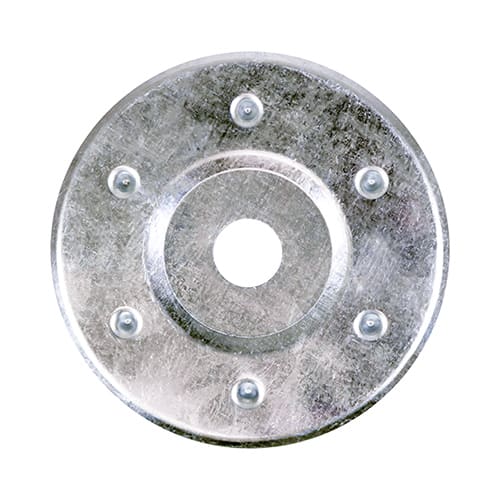Insulation Washers
(3 Products)Insulation washers are disc-shaped components used alongside screws and fixings to secure insulation materials without damaging them. They help spread pressure evenly across the surface, prevent tearing or compression, and reduce heat loss by limiting thermal bridging.
What Are Insulation Washers?
Insulation washers are small disc-shaped parts that hold insulation materials in place during installation. You’ll usually find them paired with screws, nails, or other fasteners, especially when attaching insulation to surfaces like brick, timber, concrete, or metal.
When placed between the fastener and the insulation board, they spread out the pressure of the fixing. This helps stop the insulation from getting crushed or damaged over time, especially with softer materials.
There’s another reason they’re used: thermal bridging. That’s when heat passes through a material that conducts energy more easily than the insulation around it.
Metal screws, for example, allow heat to escape straight through the wall. Insulation washers break that path, which helps keep the insulation performing the way it’s supposed to.
Applications
- External Wall Insulation (EWI) systems
- Roof insulation, especially in flat roof builds
- Floor and ceiling insulation
- Mechanical fixing of rigid insulation boards (EPS, PIR, XPS, etc.)
- Acoustic panels and fire-resistant insulation
Basically, anywhere you're attaching insulation directly to a substrate, there's a good chance you'll need washers.
Types of Insulation Washers
- Plastic washers are lightweight and don’t rust. They’re common in standard residential work and are usually made from tough plastic like polypropylene.
- Metal washers, often made of stainless or galvanised steel, are stronger and more suited for tougher environments or when extra grip is needed.
- Fender washers are wider than normal, which spreads the load and reduces the chance of insulation being crushed - especially useful when dealing with mineral wool or softer panels.
How to Choose the Right Washer
When selecting insulation washers, consider:
- What Type of Insulation Are You Using? Softer materials tend to need washers with a wider face to avoid damage.
- How Are You Fixing It In Place? Not all washers fit all fasteners. Check compatibility first.
- Is The Area Exposed To Moisture Or Temperature Swings? For outdoor jobs or damp environments, rust-resistant materials are a must.
- What Surface Are You Fixing Into? Whether it’s concrete, brick, timber, or metal, the base material plays a role in what fixing system you’ll need. Substrate material - Concrete, brick, timber, or metal all require different types of anchors and washers.
Installation Tips
- If you're working with tough surfaces, like concrete or brick, pre-drill pilot holes to make things easier and avoid cracking the material.
- Don’t overdo the tightening. If you screw it down too hard, the washer can warp, or worse, crush the insulation underneath.
- Keep your fixings spaced out evenly. It’s a small detail, but it stops boards from sagging or pulling away over time.
- Some situations call for backing plugs. If you’re after extra support (or a tighter seal against air movement) adding a backing plug can help.
Frequently Asked Insulation Washers Questions
Do Insulation Washers Work With All Types Of Insulation Boards?
Not in every case. A lot of washers are made to be fairly universal, but that doesn’t mean they’re perfect for everything.
Rigid boards like PIR or EPS tend to pair better with certain washer sizes, while softer materials like mineral wool need something with a bit more surface area to stop them from getting squashed.
Getting a good match between the washer and the insulation type helps avoid problems like tearing or a weak hold.
Can I Reuse Insulation Washers If I’m Replacing Insulation?
You can, but it’s not always the best idea. Plastic ones, for instance, can get brittle or misshapen when you pull them out, and even metal washers might bend slightly or show signs of rust, especially if they’ve been in place for years.
If you’re after a reliable, long-lasting fix, it’s usually safer to go with new ones.
Are Insulation Washers Fire-Rated?
Most standard washers are not fire-rated. If you're working on a fire-rated wall or ceiling system, you’ll need to check that both the insulation and its fixings, including washers, comply with the necessary fire safety standards.


.jpg)

